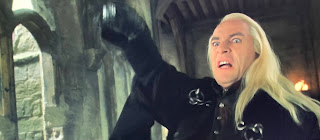The Secrets of Dumbledore introduces us to a long-ignored nephew/son, a new Grindelwald and a whole new magical world that is beyond our dreams and expectations.
The Secrets of Dumbledore does not introduce us to a tight plot, plausible characters or any kind of tension or even consistency with what has gone before.
I want to write that I watched SoD yesterday but I really didn't. After 30 minutes of focused attention, I found myself giving up any hope of finding a film deserving of that attention as the plot meandered, the characters blathered and the special effects took the front seat.
I started tidying up my den. I wandered into a nearby storage room to give it a much needed reorganisation. I talked to my sister on the phone.
This is a boring, lazy, silly film. Filled with scenes that go on much too long, even (long) scenes that aren't required at all. Filled with characters who some must find charming yet serve no real purpose: Jacob Kowalski? Seriously? Bunty Goodacre? Really? Even Newt Scamander is barely tolerable as a character.
I guess some Harry Potter fans are thrilled to see Minerva McGonagall as a young woman for a full 12 seconds. Or to hear familiar names like Rosier, Carrow, and Zabini attached to non-descript characters who appear and then disappear from the screen.
But really... SoD is a disaster.
Please, Jo, please. Stop. Respect the masterpiece you created in the seven Harry Potter books. Let them live on untainted by any more attempts to fill in the backstory, to cash in on the glory.
How many additional family members can you possibly discover? Now it's Aberforth who has an all-powerful child whom he has cast alone into the world.
How many more additional powers can you give to... well, every main character? Originally, wizards and witches, like all humans, were all relatively even in their powers and abilities. Albus Dumbledore, Voldemort, Bellatrix... perhaps a few others rose above the rabble. People with exceptional ability were recruited to be Aurors for the Ministry.
And even those people of exceptional ability, up to and including Albus and Voldemort, faced some limits to what they could accomplish magically.
In this new Fantastic Beasts version of pre-history, nothing is impossible. Nothing is even consistent. And it's maddening.
You worked very hard in the early books to establish what is possible and what is not, magically. To make clear the training required to accomplish even that limited set of possibilities, of how only truly extraordinary people like Albus Dumbledore and Tom Riddle were to be able to rise above and accomplish more. More, sure, but still within limits.
And now you've just declared open season. There are no limits. And, as a result, there's no drama.
Albus is bound by a blood oath with Grindelwald until, suddenly, he isn't. Why? Apparently because Grindelwald tried to hurt a newly recognised Dumbledore nephew. But Grindy has hurt Credence before. With no apparent impact.
Grindelwald can bring animals back to life (I was waiting with bated breath for the word "Inferi" to be uttered). Dumbledore can create alternative realities in which he battles Credence. Fantastic Beasts can do fantastic things, even if we've never heard of them and their abilities just happen to suit the needs of the particular plot situation.
In the process, all tension, all suspense is undermined. If any major character can accomplish anything, then why should we worry about the outcome? Well, unless we are completely terrified that Newt will not be able to give his best-man speech at the wedding that is the subject of a ridiculous 20-minute epilogue to this already over-long film.
I could go on to talk about the over-the-top, smack you in the face allusions to American politics and the rise of authoritarianism but I think I need to go. Wash my hands. Cleanse SoD from my brain and move on with my life.




